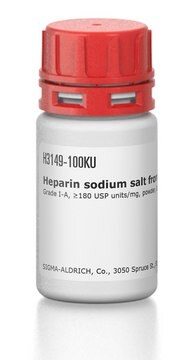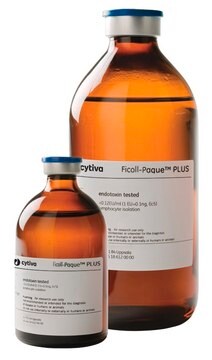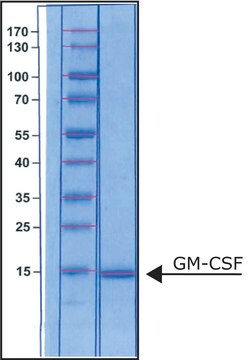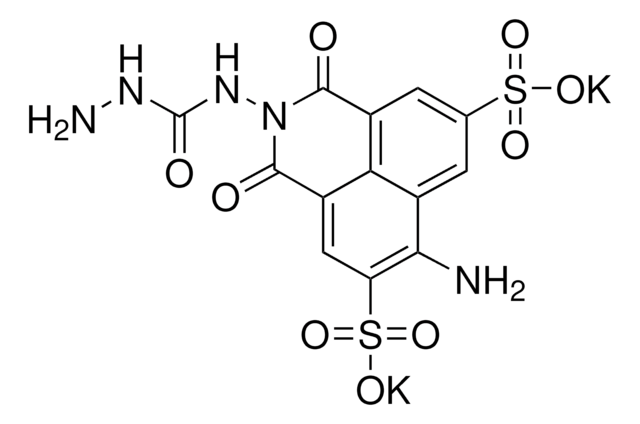M6667
Monocyte Chemotactic Protein-1 human
≥97% (SDS-PAGE and N-terminal analysis), recombinant, expressed in E. coli, lyophilized powder, suitable for cell culture
Sinonimo/i:
MCP-1
Autenticatiper visualizzare i prezzi riservati alla tua organizzazione & contrattuali
About This Item
Prodotti consigliati
Origine biologica
human
Livello qualitativo
Ricombinante
expressed in E. coli
Saggio
≥97% (SDS-PAGE and N-terminal analysis)
Stato
lyophilized powder
Potenza
5-60 ng/mL EC50
PM
8.7 kDa
Confezionamento
pkg of 10 μg
tecniche
cell culture | mammalian: suitable
Impurezze
endotoxin, tested
N° accesso UniProt
Temperatura di conservazione
−20°C
Informazioni sul gene
human ... CCL2(6347)
Descrizione generale
Monocyte chemoattractant protein-1 (MCP-1) or monocyte chemotactic and activating factor (MCAF) is part of the C-C chemokine family. The gene encoding this protein is localized on human chromosome 17q12.
Applicazioni
Monocyte chemotactic protein-1 (MCP-1) has been used to study its effects on the motility of lymphoblastoid cell line NC–NC cells.
Azioni biochim/fisiol
The biological activity is measured by its ability to chemoattract BaF3 mouse pro-B cells transfected with human CCR2A. The ED<SUB>50</SUB> for this effect is typically 5-30 ng/mL.
Measured by its ability to chemoattract 2-day cultured human monocytes, Matsushima, K., et al. (1989) J. Exp. Med. 169:1485, the ED<SUB>50</SUB> for this effect is typically 5-20 ng/mL.
Monocyte chemoattractant protein-1 (MCP-1) triggers the activation of monocytes by triggering degranulation as well as respiratory burst activity in monocytes. It facilitates monocytes in inhibiting or enhancing the growth of specific brain tumor cell lines. MCP-1 chemoattracts monocytes, macrophages, T cells and natural killer cells. The protein is overexpressed in atherosclerosis, idiopathic pulmonary fibrosis, rheumatoid arthritis and delayed hypersensitivity reactions. It is also implicated in Kawasaki disease.
Measured by its ability to chemoattract 2-day cultured human monocytes, Matsushima, K., et al. (1989) J. Exp. Med. 169:1485, the ED<SUB>50</SUB> for this effect is typically 5-20 ng/mL.
Monocyte chemoattractant protein-1 (MCP-1) triggers the activation of monocytes by triggering degranulation as well as respiratory burst activity in monocytes. It facilitates monocytes in inhibiting or enhancing the growth of specific brain tumor cell lines. MCP-1 chemoattracts monocytes, macrophages, T cells and natural killer cells. The protein is overexpressed in atherosclerosis, idiopathic pulmonary fibrosis, rheumatoid arthritis and delayed hypersensitivity reactions. It is also implicated in Kawasaki disease.
Stato fisico
Lyophilized from a 0.2 μm filtered solution in phosphate buffered saline containing 0.5 mg bovine serum albumin.
Codice della classe di stoccaggio
11 - Combustible Solids
Classe di pericolosità dell'acqua (WGK)
WGK 2
Punto d’infiammabilità (°F)
Not applicable
Punto d’infiammabilità (°C)
Not applicable
Dispositivi di protezione individuale
Eyeshields, Gloves, type N95 (US)
Scegli una delle versioni più recenti:
Possiedi già questo prodotto?
I documenti relativi ai prodotti acquistati recentemente sono disponibili nell’Archivio dei documenti.
99mTc-HMPAO labelling inhibits cell motility and cell proliferation and induces apoptosis of NC?NC cells
Mutation Research. Genetic Toxicology and Environmental Mutagenesis, 631(2), 69-76 (2007)
Interleukin 7 receptor a chain (IL7R) shows allelic and functional association with multiple sclerosis
Simon G Gregory
Nature Genetics, 39(9) (2007)
Expression of monocyte chemoattractant protein-1 in Kawasaki disease: the anti-inflammatory effect of gamma globulin therapy.
Asano T and Ogawa S
Scandinavian Journal of Immunology, 51(1), 98-103 (2000)
Monocyte Chemoattractant Protein-1 (MCP-1/CCL2) Levels and Its Association with Renal Allograft Rejection.
Raza A
Immunological Investigations, 46(3), 251-262 (2017)
Articoli
Lipid Induced Insulin Resistance
Il team dei nostri ricercatori vanta grande esperienza in tutte le aree della ricerca quali Life Science, scienza dei materiali, sintesi chimica, cromatografia, discipline analitiche, ecc..
Contatta l'Assistenza Tecnica.








